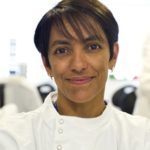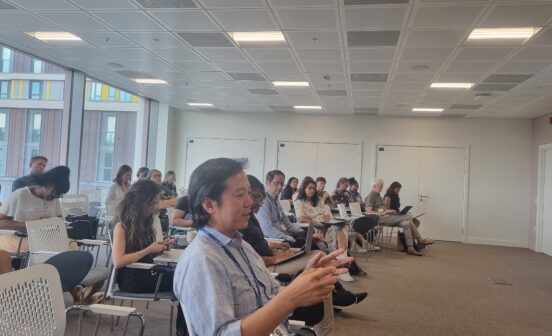We provide state-of-the-art microbiology research space to support translational research in antimicrobial resistance (AMR)
The Colebrooks’ History
The laboratory is named in honour of brother and sister Leonard and Dora Colebrook, who worked at Queen Charlotte’s Hospital in the 1930s.
Leonard undertook the first trials of antibacterial treatments, evaluating Prontosil Red, a sulfonamide, to treat streptococcal puerperal sepsis. Within a year, the use of sulfonamide became widespread and dramatically reduced mortality from sepsis.
Dora’s research showed that the same group A streptococci that endanger women during childbirth also circulate in the general population and cause sore throat infections. Her work helped to establish good hygiene practices within the medical community.
State-of-the-art equipment that streamlines your research
The Colebrook Laboratory offers researchers access to cutting-edge microbiological equipment, biobanking facilities, and pathogen genome sequencing services via the BRC Genomics Facility. Our advanced tools provide fast, precise, and accurate detection of microorganisms, enabling seamless research workflows. The lab supports every stage of sample processing, from sample preparation, testing to storage. A recent expansion of freezer and bench space offers additional capacity to better accommodate researchers’ needs. Some of our highlighted equipment includes:
- MALDI-TOF Mass Spectrometry
Allows unbiased identification of microorganisms within minutes, down to the species level. This system is equipped to identify bacteria, yeast, filamentous fungi, mycobacterium, and positive blood cultures. - BIOFIRE® FILMARRAY® TORCH
A multiplex PCR system that tests simultaneously for bacteria, viruses, yeast, parasites, and antimicrobial-resistant genes. With just 2 minutes of hands-on time for sample preparation, results are available in around 1 hour. - Incubators (Anaerobic, Aerobic, and CO2)
Facilitate the cultivation of microorganisms in various environmental conditions. - Dual-Head Microscope
Supports teaching activities. - Other Specialist Equipment
Includes tools for molecular biology and microbiology, streamlining research processes.
What’s happening at the Colebrook lab?
- Supporting Human Challenge studies
Human challenge studies are clinical trials where healthy volunteers are exposed to a pathogen under controlled conditions. Pioneering work in this area is led by Imperial researchers, including Dr Malick Gibani’s group who utilised the facility to create Salmonella challenge agents, culture samples, and confirm infection status with MALDI; and Prof Chris Chiu’s group who utilised the BioFire system for screening participants for RSV human challenge study.
- Supporting epidemiological surveillance
The Colebrook Lab played a critical role in sample collection and testing, helping to track scarlet fever transmission in schools (School Transmission Studies). The lab continues to be central to surveillance efforts for other infectious diseases in partnership with UKHSA. Our pathogen detection systems identified a surge in severe invasive Strep A infections after pandemic restrictions were lifted (Vieira et al., 2024). We also support research by Dr. Lucy Lamb on Staphylococcus aureus screening in UK military populations, and Dr. Frances Davies’ work on surveillance of drug-resistant Enterobacterales in hospitals.
- Supporting diagnostic tool development
Research on developing diagnostic tools has greatly benefited from the lab’s state-of-the-art facilities and location within the NHS Trust Diagnostic Laboratory at Charing Cross Hospital. During the early stages of the COVID-19 pandemic, the London Biofoundry trialled a novel robotic testing platform for SARSCoV2 in the Colebrook laboratory prior to being expanded four-fold and rolled out to provide Trust-wide testing. Coupled with the BioAID infection biorepository, the lab supports large-scale studies. Studies benefiting from using the Colebrook lab include point-of-care diagnostic research led by Dr Jesus Rodriguez Manzano, research in biomarkers that distinguish viral infection from bacterial infection by Dr. Ravi Mehta (Mehta et al., 2022), and evaluation of rapid antigen tests for strep A in outbreak settings, by Ewurabena Mills, led by Prof Shiranee Sriskandan.
- Support therapeutic research
The proximity to Charing Cross Hospital allows the Colebrook lab to support numerous therapeutic studies. Currently, the lab facilitates blood and urine sample processing for two major antimicrobial therapy research projects: the outpatient parenteral antimicrobial therapy service (OPAT study, by Prof Alison Holmes), and CAMO-DATA TDM study which evaluates the role of therapeutic drug monitoring in antimicrobial target attainment (Dr Tim Rawson and Prof Alison Holmes).
Get in touch
The Colebrook Lab is committed to fostering excellence in multidisciplinary health protection research while building research capacity among students, trainees, and professionals. If this aligns with your interests, feel free to reach out to Dr. Stephanie d’Arc, Colebrook Lab Manager, at s.darc05@imperial.ac.uk.
Application Process
The laboratory is governed by an overarching Management Committee comprising representation from Imperial College London, North West London Pathology, Imperial College Healthcare NHS Trust and the NIHR Imperial BRC. The Committee’s role is to ensure the remit of the laboratory in enabling AMR research is fulfilled.
To submit a request to use our facility, please fill in the Request Form and submit it to Dr. Stephanie d’Arc, Colebrook Lab Manager, at s.darc05@imperial.ac.uk.
Acknowledgement
Any publications arising from research that has used the Colebrook Laboratory must acknowledge support from the NIHR Imperial BRC. This applies to all clinical academic research papers and outputs, regardless of whether they have received direct BRC funding or not.
“[Insert name] acknowledges that Microbiological work/Sample collection/Sample preparation [insert type of work/analysis] was undertaken at the Colebrook Laboratory, a facility supported by the NIHR Imperial Biomedical Research Centre (BRC)”.
Colebrook Brochure
Follow the link to download the Colebrook Brochure.
Key Individuals
-
Dr Stephanie M d'Arc
Laboratory Manager- Department of Infectious Disease -
Professor Shiranee Sriskandan
Professor of Infectious Diseases


